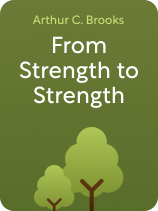

This article is an excerpt from the Shortform book guide to "From Strength to Strength" by Arthur C. Brooks. Shortform has the world's best summaries and analyses of books you should be reading.
Like this article? Sign up for a free trial here.
How does your intelligence change as you get older? How can you leverage your changing brain to maintain your success over time?
It’s typical to experience some degree of mental decline as we age. But, management expert Arthur Brooks says there’s good news. To continue being successful in your career, you just need to start relying on a different type of intelligence and find work that suits this different skill set.
Keep reading to learn how Raymond Cattell’s intelligence theory provides us with some encouragement.
Raymond Cattell’s Intelligence Theory
For people working in practically any skilled job, professional decline sets in sometime between their late 30s and early 50s. This means that they start losing their job skills—they can’t think as quickly and solving problems becomes more difficult.
While professional decline sounds disheartening, Brooks says you can turn this potential deterioration into an opportunity to find new types of success in the second half of your life. To clarify how a mental decline can lead you to new kinds of success, Brooks first explains that you’re not really getting less intelligent as you age; rather, you’re becoming weaker in some areas but stronger in others.
According to Brooks, British psychologist Raymond Cattell believes there are two different types of intelligence: one that relies on creativity and quick thinking and one that relies on knowledge and experience. Let’s take a look at Raymond Cattell’s intelligence theory and see how you can leverage your intelligence to thrive professionally over time.
(Shortform note: It’s a common misconception that “intelligence” refers to a single ability; as Jim Kwik explains in Limitless, many people think they’re not intelligent because they don’t do well on IQ tests. However, IQ—the commonly accepted measurement of intelligence—only measures your ability to solve specific types of problems using logic. Kwik says there are numerous other types of intelligence, and everyone is exceptionally smart in at least one way. For example, one person might be extremely good at understanding big ideas, while another is detail-oriented. Both people could be geniuses in their own ways, but if they try to take on each others’ roles, they’d struggle and end up feeling unintelligent.)
Fluid Intelligence
The first type of intelligence is what Cattell calls fluid intelligence. This is your ability to reason, innovate, discover new things, and devise creative solutions to problems. This type of intelligence peaks in early adulthood and then starts to decline in your 30s or 40s. Unfortunately, this is the type of intelligence that many skilled jobs rely on, which is why Brooks says your professional skills will also begin to deteriorate around that time.
(Shortform note: While an eventual decline may be inevitable, there are numerous ways to “exercise” your brain and boost your fluid intelligence. Anything that pushes your mental limits, such as learning new skills or playing strategic games like chess or Go, will strengthen your brain. Taking good care of yourself is also crucial to keeping your skills sharp: a healthy diet, good sleep habits, and regular exercise will all help boost your creativity and focus regardless of your age.)
Crystallized Intelligence
The second type of intelligence is what Cattell calls crystallized intelligence. This is the sum total of what you’ve learned in your life, which means it just keeps increasing (barring an injury or disease that affects your brain). In other words, as the creativity of youth fades, the wisdom and experience of age grow stronger and take its place.
(Shortform note: There are also ways to boost your crystallized intelligence. Learning any kind of new information will strengthen your memory along with your ability to solve problems using established knowledge rather than innovation. For example, learning a new language, taking a class, and reading will all boost this kind of intelligence.)

———End of Preview———
Like what you just read? Read the rest of the world's best book summary and analysis of Arthur C. Brooks's "From Strength to Strength" at Shortform.
Here's what you'll find in our full From Strength to Strength summary:
- Why our professional skills start to decline as we get older
- How second half of your life can be even happier than the first
- How to find a new career path that suits your changing skill set






